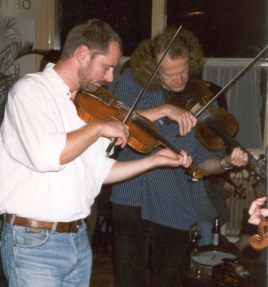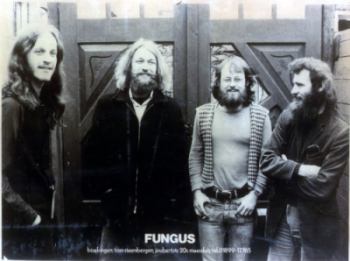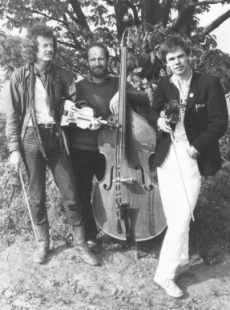
Traditional music from the Netherlands Part II:
1974-1982: The Golden
Years of the Dutch Folk Music
Folk in the big Dutch cities
When people talk about Dutch folk or folk-rock music they usually refer to music which dates from the seventies or early eighties. During this period the Netherlands had their biggest revival of folk music. For this article I visited Jos Koning who was part of this revival. I chose Jos not only because he is a musician, but also because he studied musicology and his final thesis, which he wrote in the early eighties, was an analysis of the Dutch folk movement. His story surprised me now and again because from his words I understood that this revival was more than just music but also a political and ideological movement. In this interview he expresses his personal view on the golden years of Dutch folk. It is important to know that Jos sees things from the "city" point of view. In those days he lived in Amsterdam and before the interview he pointed out that there is a big difference between the folk movement in the cities and the movement in rural areas far from the cities.
 |
|
|
As many other musicians, Jos started playing music in several school-bands. First he played the guitar and later the violin, which still is his main instrument. He started studying musicology in Amsterdam and, instead of specialising in classical violin, he got interested in folk and pop music. The first group Jos played in and that was known in Holland was Crackerhash. Originally this group played English and Scottish traditional music like many other bands in the early 70's.
I asked Jos how the folk revival started and he tried to explain his vision on the Dutch folk movement of the seventies and early eighties. Jos: "First of all I think it is good to point out that the seventies' revival is not the first revival of folk music. Already around 1900, when there was more and more industrialisation and people started to move to the cities, there was a kind of revival. In several countries, including the Netherlands, you had 'academics' from the cities who went to the countryside to study and collect there the music the people made. They often re-wrote the music for piano. It was as if they wanted to return to something they had given up by moving to the city."
"During the seventies mainly intellectual people were part of the new revival.
We had several bands that played English, Scottish or Irish music but people
seldom played Dutch music. The Dutch groups that performed abroad were often
asked to play something from their own culture. However, they were not able
to do so because they lived in big cities and had lost contact with folk music.
I know people said that it was "their music", but it wasn't. It is stupid to
say that these musicians had their own traditional music because they did not
have any.
But in 1974 things started to change: Fungus recorded their first album,
Pitchwheel changed their name into Wargaren and, more importantly,
artists like Martin Carthy told us that we should play our own traditional
music. Musicians started looking for material in archives and found dances and
ballads they had never heard before but it was "their" traditional music. These
English folk singers were our idols; when they said something we listened to
and obeyed them. So, many groups started playing Dutch folk music."
"The musicians really enjoyed it and found a musical satisfaction in their traditional music. Different was the movement around the musicians. It mainly consisted of well-educated, left wing students who talked about bringing folk music back to the people. The intellectuals who lived in a city felt that they had lost an essential part of themselves and romanticised it. They wanted to be part of a group, go back to tradition and then things would get better. Apart from that, they had this ideology of being the same as "ordinary" people, which fitted into the political ideas of this movement. For this rather large group it was not only the music that counted; the political and social discussions were important to them as well."
 |
|
|
It is remarkable that the whole folk movement suddenly disappeared around 1982. A few groups still recorded albums after that year but most groups stopped and we have never heard of them since. I asked Jos what had happened and whether he could explain this sudden "death" of Dutch folk music?
Jos: "I don't know what happened exactly. I have some ideas but I am not sure if I could tell you the real reason. It started at the end of 1981, suddenly there was a crisis. Folkclubs closed and festivals stopped. We noticed this with the 1e Hollandse Dansband. We had just recorded our first album and we had a lot of trouble finding places to play. That was new, there had always been enough places to play. Within a few months it was all gone and only a few groups survived, but they never got as much attention as before."
 |
|
Photo: Twee Violen en een Bas; |
"I think it had something to do with the fact that in a society people in the age group 20-30 create the cultural landscape. But then, all these 20-year-old ideological students were in their thirties, had finished their studies and had nice jobs. They were still interested, but preferred attending important board-meetings to organising folk-evenings. Besides, I think we realised that the folk music we were playing was not really our music. So within a very short period of time everything stopped and there was not a new group of young people to take over. They were not interested in working with traditional material in the artificial way we did. They were a new generation with their own culture and ideas. I think these are a few reasons why it all stopped. But I cannot explain why it disappeared almost completely in the Netherlands, while in other countries there was merely slightly less interest in folk music."
Jos talks about this decade of folk music in a very open way, with humour and self criticism. What did this period bring him, and what did he do after 1982?
Jos: "One of the ideas was that we should open the stages to everybody. So,
if you could hold your instrument, you played on stage for other people. Sometimes
the things you heard were terrible, but you could experiment as much as you
liked. The reason I am a professional musician now is that I could practise
on stage then and could do all the experimenting I needed."
"These days I play Greek music in Palio parea, but before that I started
my main group Knerp in 1978, which was later named Twee violen en
een bas. We focused on music from around 1700. This group, and especially
the period after we changed our name into Twee violen en een bas, is
my small contribution to the music in the Netherlands. Of course I also played
in Perelaar for a short while, recorded some Dutch songs with Crackerhash
and took part in the 1e Hollandse Dansband project. With my new group,
however, I had the feeling that I really could do what I wanted. I could improvise
and really put something of myself into the music. They were still old tunes
but I felt free to do with them what I wanted. Besides Knerp I started
to give school-concerts with Windkracht 8. We sang shanties at primary
and secondary schools. Unfortunately, both groups do not exist anymore. I especially
miss Twee violen en een bas very much. So, if we can find a good new
violinist, we might start this group again.
JOS' CHOICE
As I asked Guy Roelofs before, I also asked Jos what he would choose as the
most important records in Dutch traditional music history. He chose:
- Fungus: "Lief ende leid", "because this is their first album that was completely sung in Dutch. Somehow Fungus had a special place in the Dutch folk-scene. I don't know why, but not everybody accepted them. They were put on a sidetrack and they didn't belong there".
- Wolverlei: "Wind tegen". "This is the best record that came out of the scene I talked about in this interview. This is quality music."
- "For the third record I cannot decide between 1e Hollandse Dansband, the first Perelaar record or the first record of Twee violen en een bas."
| RECORDS: | CD'S: |
| Crackerhash: The elfin knight (universe hot 1.04) | Twee violen en een bas: Twee eeuwen Hollandse dansmuziek (syncoop 5756cd198) |
| Crackerhash/Dommelvolk: Dommelbeschuit (universe ??) | Twee violen en een bas: Amsterdam 1700 (syncoop 5751cd115) |
| Crackerhash: Napoleon crossing the Rhine (universe ls-3) | Palio Paréa: Stin Perron (CHARA 2001) |
| Crackerhash: Don't forget your old shipmate (universe dls-60) | |
| Perelaar: Zijsprong (Hakketoon 198227) | |
| Perelaar: Jan koop mij kermis (syncoop 574604) | |
| 1e Hollandse Dansband : springtij (hakketoon 198219) | |
| Knerp: Knerp (discus 7043) | |
| Knerp: Twee violen en een bas (hakketoon 198218) |
Most records are only available on record fairs or in secondhand shops. If you are interested in these records or want to hear something, please contact the author.
Do you have any questions about the article? Do you want more information? Are you interested in one of the albums mentioned above? Feel free to contact me any time; also with suggestions for future articles etc or comments on this article. Eelco Schilder
All material published in FolkWorld is © The Author via FolkWorld. Storage for private use is allowed and welcome. Reviews and extracts of up to 200 words may be freely quoted and reproduced, if source and author are acknowledged. For any other reproduction please ask the Editors for permission. Although any external links from FolkWorld are chosen with greatest care, FolkWorld and its editors do not take any responsibility for the content of the linked external websites.
